Tempeh, a fermented soybean cake, holds a revered place in Balinese cuisine. Travelers to the island can now enjoy the art of traditional tempeh-making and Balinese cooking through an engaging class in Seminyak. Led by expert host Ayu, you will not only learn the cultural significance of this versatile ingredient but also master the techniques for crafting tempeh from scratch. Paired with a menu of vegan-friendly Balinese dishes, this hands-on experience promises a delectable journey into the heart of the island’s culinary traditions. What secrets might this class unveil about the diverse flavors of Bali?
This experience made our list of the 9 Best Cooking Classes In Seminyak.
Key Points
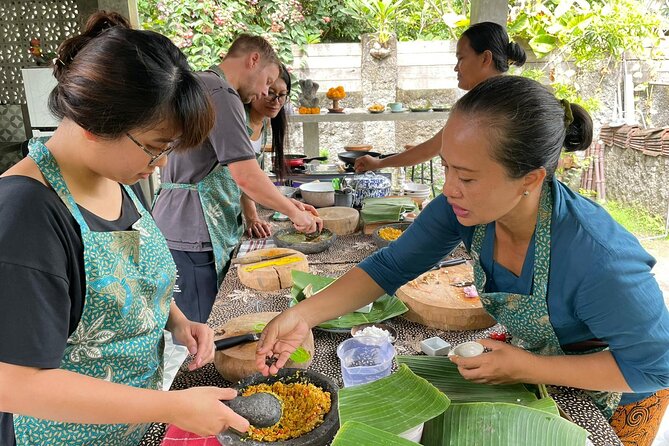
• The cooking class teaches participants the traditional method of making tempeh, a versatile ingredient in Balinese cuisine, and how to prepare various Balinese and Indonesian vegetarian dishes.
• The class menu highlights seven vegetarian dishes, including Tempe and Tofu Curry, Tum (steamed tofu or chicken in banana leaves), and Tempe Manis (sweet and sour tempeh).
• The class is held at the Canang Sari Homestay in Denpasar, Bali, and participants can access the location via taxi or ride-hailing services.
• The class is suitable for various dietary requirements, including vegan options, and the host is flexible in accommodating participants’ needs.
• Participants can learn traditional Balinese cooking techniques, such as Tum (steaming in banana leaves), Sayur Urab (fresh vegetable salad with coconut), and making various sambals (chili-based condiments).
Overview of the Cooking Class
The cooking class, titled ‘Traditional Tempeh Making & Cooking Balinese Cuisine,’ is hosted in Seminyak, Indonesia, and is designed for a small group of up to 10 travelers.
Priced from $39.00, the class begins at 9:30 am and lasts for an undisclosed duration. Participants receive confirmation at the time of booking and can cancel for free up to 24 hours before the class.
The class covers the traditional art of tempeh making and introduces guests to the vibrant flavors of Balinese cuisine. Catering to various dietary needs, including vegan options, the class promises an engaging and informative culinary experience for all attendees.
Want to bring Seminyak's flavors home? More hands-on cooking experiences we cover
Importance of Tempeh
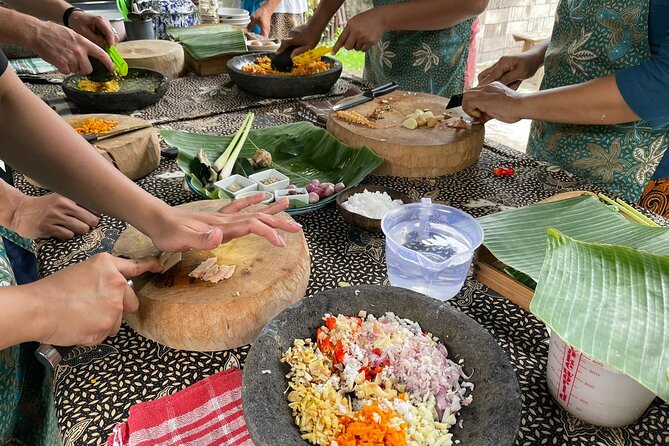
Tempeh serves as a versatile ingredient that frequently features in Balinese cooking, owing to its rich nutritional profile and ability to absorb flavors. This traditional soy-based product is revered for its unique texture and tanginess, which complement the bold spices and aromatics typical of Balinese cuisine.
During the class, participants learn the intricate process of making tempeh from scratch, gaining an appreciation for the cultural significance and culinary versatility of this ingredient.
The host, an expert in Balinese cooking, shares the history and traditional methods of tempeh production, ensuring a comprehensive understanding of this beloved staple.
Regardless of dietary preferences, the class caters to all, offering vegan and vegetarian options that showcase the versatility of tempeh.
Class Menu Highlights
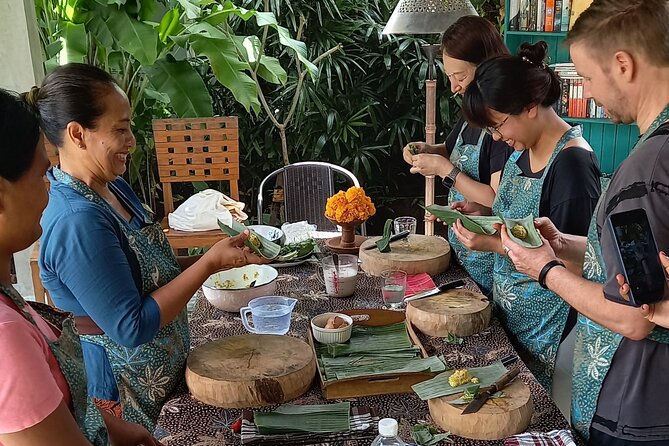
Along With the tempeh-making demonstration, participants can expect to savor a delectable lineup of seven vegetarian Balinese and Indonesian dishes, all served alongside steamed rice.
The menu highlights include a Tempe and Tofu Curry with a traditional Balinese base, a savory Tum of steamed tofu or chicken wrapped in banana leaves, and the sweet and sour Tempe Manis.
Other dishes feature Sayur Urab, a vegetable medley with coconut seasoning, a Balinese Spiced Chicken Curry (or tofu/tempeh for vegans), crisp Tempe Mendoan, and the fiery Eggplant Sambal and Sambal Matah condiments.
This diverse culinary experience allows participants to enjoy the vibrant flavors of Balinese cuisine.
Meeting Point and Accessibility
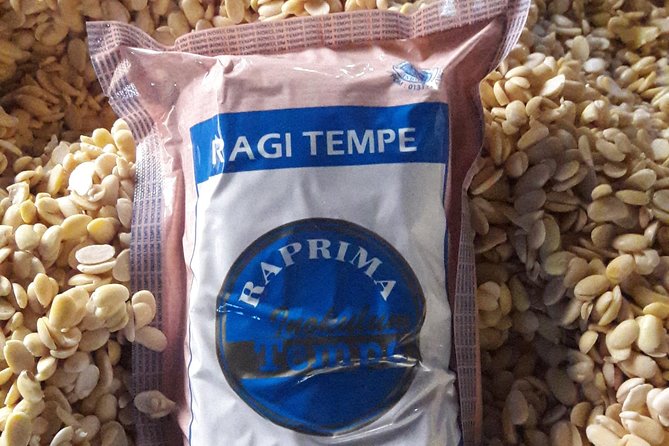
Participants can meet at the Canang Sari Homestay in Denpasar, Bali, located at Jalan Nangka Selatan Gang Kaswari No. 6, Dangin Puri Kaja, Denpasar Utara, Bali 80234. The class venue is accessible by taxi or ride-hailing services like Grab and Gojek, though it’s not wheelchair accessible and may not be suitable for those with strollers.
| Accessibility | Status |
|---|---|
| Wheelchair | Not Accessible |
| Stroller | May Not Be Suitable |
| Taxi/Ride-Hailing | Accessible |
The host provides clear directions to the meeting point, ensuring participants can easily find the location and begin their traditional tempeh making and Balinese cuisine cooking experience.
Participant Reviews and Feedback
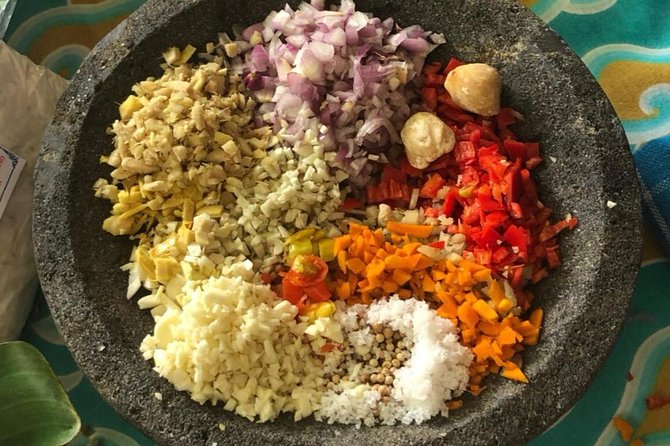
The class has garnered overwhelmingly positive reviews, with participants consistently praising the exceptional host Ayu and her extensive cooking knowledge.
Feedback highlights include:
-
An engaging and informative class experience that leaves participants eager to return and try the recipes at home.
-
Delicious end products and well-presented dishes that exceed expectations.
-
An option for online cooking classes, providing added convenience for those unable to attend in-person.
-
The class’s ability to cater to various dietary requirements, including vegan options, ensuring an inclusive experience.
-
The small-group format which allows for personalized attention and a more intimate learning environment.
- Snorkeling In Nusa Penida Departing From Bali Island
- Private Arrival Transfer: Bali Airport to Hotel
- Bali Tour: Spiritual Cleansing and Shamanic Healing
- Bali Private Food Walking Tour With Locals: The 10 Tastings
- Tickets Inclusive: Ubud Wonder-Full Day Tour
- Bali Private Car Charter With English Speaking Driver To Ubud Area
Making Tempeh From Scratch
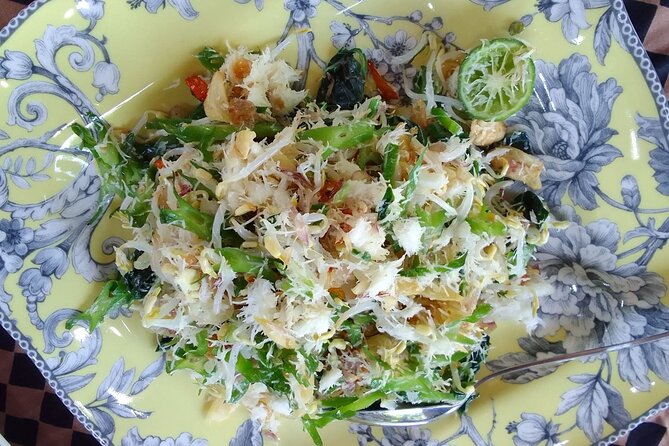
At the heart of the traditional Balinese cooking class lies the intricate process of making tempeh from scratch, a skill that participants eagerly learn from the expert guidance of the host, Ayu. Tempeh, a fermented soybean cake, is a staple ingredient in Balinese cuisine, and understanding its preparation is crucial to mastering the region’s flavors.
During the class, Ayu takes participants through the step-by-step process, sharing the history and cultural significance of this beloved ingredient. The participants observe and actively participate, gaining hands-on experience in transforming soybeans into a nutritious and versatile ingredient. The class not only teaches the technical aspects of tempeh making but also showcases its importance in Balinese culinary traditions.
| Step | Description |
|---|---|
| 1. Soaking | Soak the soybeans overnight to soften them. |
| 2. Boiling | Boil the soaked soybeans until tender. |
| 3. Inoculation | Add tempeh starter culture to the boiled soybeans. |
| 4. Incubation | Allow the inoculated soybeans to ferment for 24-36 hours. |
Balinese Cooking Techniques
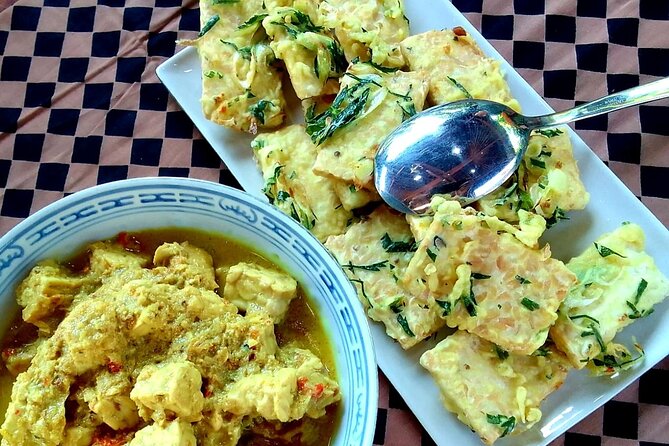
Beyond tempeh-making, the traditional Balinese cooking class delves into an array of distinctive culinary techniques that shape the vibrant flavors of the region’s cuisine. Participants learn to prepare several signature Balinese dishes, each with its own unique method:
-
Tum, where ingredients are steamed in banana leaves, infusing the food with an earthy, aromatic essence.
-
Sayur Urab, featuring a delicate balance of fresh vegetables and a coconut-based seasoning.
-
Tempe Mendoan, where tempeh is expertly fried to a crisp, golden-brown exterior.
-
Eggplant Sambal, involving the charring and pounding of chili peppers to create a fiery, flavor-packed condiment.
-
Sambal Matah, a raw sambal made with shallots, lemongrass, and kaffir lime leaves, adding a bright, zesty touch to the dishes.
Dietary Accommodations
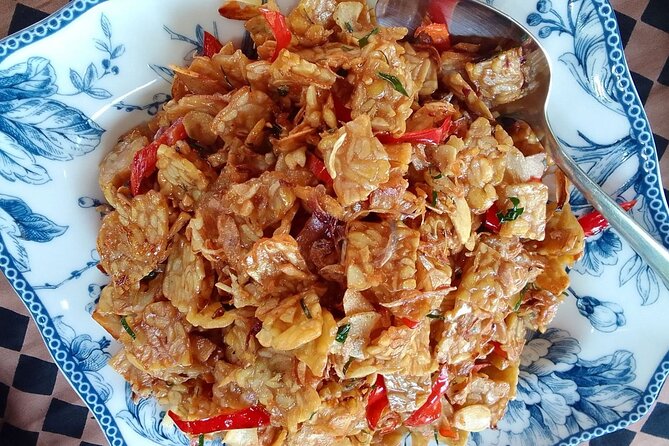
The cooking class caters to various dietary requirements, including vegan options, ensuring an inclusive experience for all participants.
The host, Ayu, is skilled at adapting the traditional Balinese dishes to accommodate different dietary needs. For instance, the Balinese Spiced Chicken Curry can be made with tofu or tempeh instead of chicken, catering to vegans and vegetarians.
Similarly, the Tum dish, typically made with chicken, can be prepared with steamed tofu as a plant-based alternative.
The class also offers a diverse selection of vegetable-based dishes, such as Sayur Urab and Eggplant Sambal, which are suitable for those following a plant-based diet.
The host’s flexibility and attention to dietary preferences create a welcoming and accessible learning environment.
Frequently Asked Questions
Is the Class Suitable for Beginners in Cooking?
Yes, the class is suitable for beginners in cooking. The small-group format, hands-on tempeh making, and step-by-step guidance from the experienced host make it an ideal learning experience for those new to Balinese cuisine.
Can the Class Be Customized for Larger Groups?
The cooking class can accommodate larger groups upon request, with special arrangements made by the host. While the class is typically limited to 10 participants, the host is willing to cater to the needs of larger parties.
Are There Any Additional Costs or Fees Not Included in the Price?
The cooking class price includes all necessary ingredients and materials. There are no additional costs or fees. The host can accommodate larger groups for an additional fee, but the standard class size is 10 participants.
Is the Class Offered in Any Other Languages Besides English?
The class is offered in English, but the host, Ayu, can provide translation assistance in other languages like Indonesian or Balinese upon request. Participants are encouraged to communicate their language preferences when booking the class.
How Long Does It Take to Make Tempeh From Scratch?
The class teaches participants to make tempeh from scratch, which typically takes around 48 hours to complete the fermentation process. This hands-on activity allows attendees to learn the traditional method of producing this versatile Balinese ingredient.
Recap
The ‘Traditional Tempeh Making & Cooking Balinese Cuisine‘ class in Seminyak, Indonesia, provides an immersive cultural experience.
Participants learn the art of tempeh-making and explore traditional Balinese cooking methods.
Led by an expert host, the class covers a range of vegan-friendly dishes, catering to diverse dietary needs.
With hands-on activities and insightful teachings, this culinary journey offers a unique opportunity to discover the rich flavors and traditions of Balinese cuisine.
More Cooking Classes in Seminyak
More Tour Reviews in Seminyak
Not for you? Here's more things to do in Seminyak we have recnetly reviewed
- 3 Best Canoe And Kayak Experiences In Seminyak
- 9 Best 2 Day Tours In Seminyak
- 11 Best 3 Day Tours In Seminyak
- 2 Best Scuba Diving Experiences In Seminyak
- 5 Best Shopping Tours In Seminyak
- 24 Best Cruises And Boat Tours In Seminyak
- 7 Best Food Tours In Seminyak
- 20 Best Full-Day Tours In Seminyak
- 2 Best Jet-Ski Experiences In Seminyak
- 5 Best 4 Day Tours In Seminyak
- 2 Best Coffee Tours And Tastings In Seminyak
- 20 Best Massage And Relaxation Services In Seminyak
